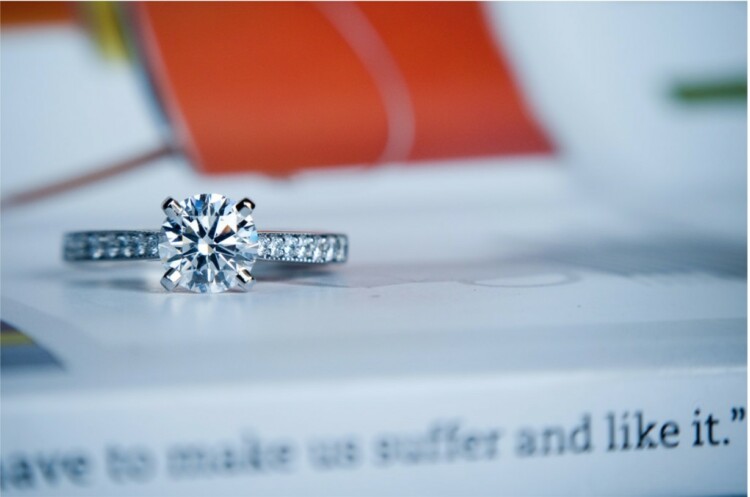
| Image by Estacy vis Flickr |
Essentially, the ‘4 Cs’ are the four factors that determine the value, quality, and beauty of diamonds in diamond engagement rings. They are cut, clarity, carat and colour. Basic knowledge of the 4 Cs is essential when buying a diamond because they can look the same but be valued very differently.
Cut
First, the cut doesn’t refer to the shape; it refers to how well the diamond was cut from the rough. It is the style or design guide used when shaping the diamond. It is not just the form of it (round, oval, square, etc.), since the cut refers to its symmetry, proportions, and polish, as well as how well the facets interact with light. The range is from Excellent to Poor. A ‘Fair’ to ‘Good’ cut grade would suit those operating on a budget. Be careful not to buy a poorly cut diamond, though, as most people find the quality unacceptable. This is possibly the most important of the 4 C’s because it will determine the level of “sparkle” she gets when showing it off to anyone who asks to see it.
Clarity
Diamonds have internal characteristics called inclusions, and surface defects called blemishes. A diamond’s clarity is the scale that grades the perfection of the jewellery; for example, the fewer inclusions the diamond has, the greater the clarity and the more valuable it will be. It is important to remember that diamonds have natural flaws and are rarely perfect.
Inclusions like cracks, air bubbles, and non-diamond minerals. Blemishes can be scratches, chips and chips. Various blemishes can be created in the cutting process, but all inclusions and most blemishes are completely natural. Clearer diamonds with blemishes and fewer inclusions are rarer and make for more expensive and vintage engagement rings. This is a major consideration when looking for breath-taking diamond engagement rings in Toronto at Diamonds for Less.
Carat
The weight of a diamond is measured in carats. A metric ‘carat’ is 200 milligrams. Carats are split into points where 100 points equal one carat. For example, a half carat diamond is a 50 point or 0.50 carat diamond. ‘Carat’ shouldn’t be confused with ‘karat’, which refers to the purity of gold.
Colour
The colour of a diamond usually refers to the presence or absence of colour in white diamonds. A pure diamond has no colour, and therefore, colourless diamonds are the most desirable for vintage engagement rings since they allow the most refraction of light (also known as sparkle). Off-white diamonds, on the contrary, absorb light.
The Diamond Certificate
The diamond certificate or grading report is sometimes known as the fifth C and is a complete evaluation of the diamond by a qualified professional. The individual characteristics of the gemstones appear on the certificate. Diamonds are issued with certificates such as Gemmological Institute of America or the American Gem Society.
Conclusion
It is evident, then, that the primary 4 Cs are essential when purchasing diamond engagement rings to ensure value and authenticity.
*This article is published in partnership with Mediabuzzer. For further info, read my disclaimer here.
